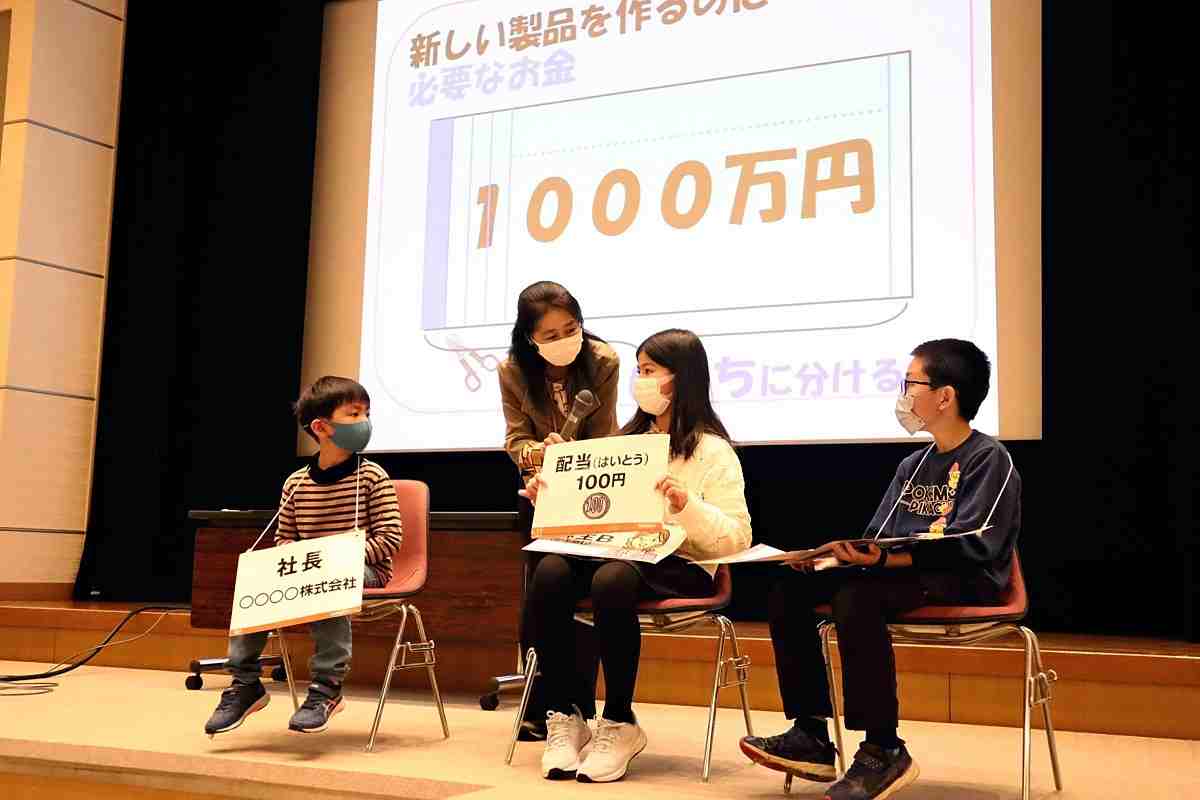
Children learn how stocks work during a seminar for elementary school students and their parents at the Tokyo Stock Exchange on March 29.
11:18 JST, April 29, 2023
As the government encourages a shift from savings to investments, efforts to teach children about money matters are spreading. Events, games, books and other activities aimed at financial education are being developed, as not many parents have the knowledge to teach their children about it.
“A company sells ‘shares’ to raise funds in order to make profits. The company then pays out ‘dividends’ to shareholders,” a lecturer said in a seminar for elementary school students and their parents held at the Tokyo Stock Exchange on March 29.
About 15 groups learned about the basics of stocks and how they are traded, and toured the TSE.
“I feel that I should learn about the risks of investing and think about it properly,” said 12-year-old Toa Imaizumi. His mother, Ayako, 50, said, “I wanted my child to learn about money, so I was looking for an opportunity.”
The TSE has been holding the seminar during long school vacations since 2004, and this year the number of applicants was four times higher than the previous high. A person in charge of the seminar said: “The generation of today’s parents grew up with little opportunity to learn about investing. I feel that many people want their children to acquire this knowledge.”
In a multiple-choice survey conducted last November by Osaka-based e-Learning Laboratory Co., which received responses from 462 parents of elementary school students and children of other age groups, 65% said the reason for financial education being needed is “the future is uncertain,” while 60% said “asset management is a matter of course.”
An Oita Prefecture-based organization nurturing children’s survivability organized a program titled “First-time Investment.” It held an event in Chiba Prefecture in late February in which about 10 groups of parents and children played a game of buying imaginary stocks with a set amount of money.
Mizuho Bank Ltd. began in February offering a simulated investment game, “Minna no yume wo kanaeyou!” (Let’s make everyone’s dream come true!), available via the app Gokko Rando, which offers children various social experiences. There are also books in which experts explain investing to the next generation of consumers.
Financial education has also been enhanced in curriculum guidelines, and since the 2022 school year, high school students have been learning about asset formation in home economics courses. On the other hand, the age of adulthood was lowered to 18 last year, and there is a risk that teenagers may encounter investing-related problems.
Shuntaro Tsukamoto, a former Financial Services Agency official and a financial educator, said: “In addition to knowing how scams work, it is important to acquire the correct knowledge about investments to avoid becoming a fraud victim. There are investment trusts that can be started with a small amount of money, and if children are interested, parents and children can work together on it.”
Top Articles in Society
-

Producer Behind Pop Group XG Arrested for Cocaine Possession
-

Man Infected with Measles Reportedly Dined at Restaurant in Tokyo Station
-

Man Infected with Measles May Have Come in Contact with Many People in Tokyo, Went to Store, Restaurant Around When Symptoms Emerged
-

Woman with Measles Visited Hospital in Tokyo Multiple Times Before Being Diagnosed with Disease
-

Australian Woman Dies After Mishap on Ski Lift in Nagano Prefecture
JN ACCESS RANKING
-

Producer Behind Pop Group XG Arrested for Cocaine Possession
-

Japan PM Takaichi’s Cabinet Resigns en Masse
-

Man Infected with Measles Reportedly Dined at Restaurant in Tokyo Station
-

Israeli Ambassador to Japan Speaks about Japan’s Role in the Reconstruction of Gaza
-

Videos Plagiarized, Reposted with False Subtitles Claiming ‘Ryukyu Belongs to China’; Anti-China False Information Also Posted in Japan






















